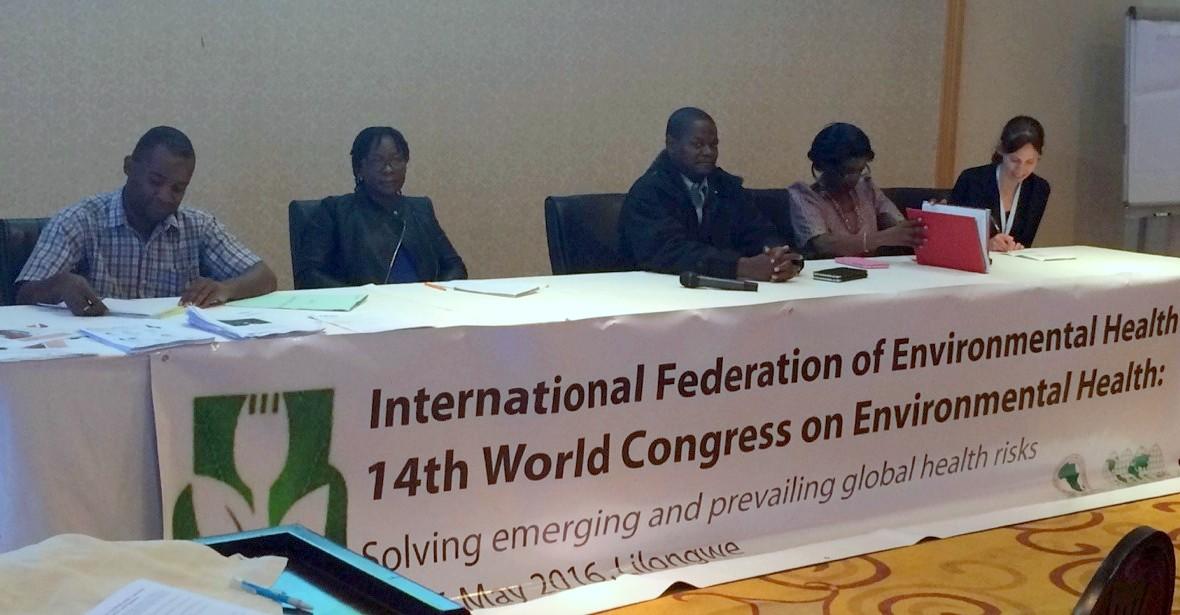SHARE at the 2016 IFEH World Congress

WASHTED/Tracy Morse
Earlier this month, on 6th May, the Malawi SHARE team attended in the 14th IFEH World Congress on Environmental Health held in Lilongwe, Malawi, which brought together Government representatives, environmental health practitioners, and researchers from across the globe to discuss a plethora of pressing issues under the conference’s theme of ‘Environmental Health: Solving Emerging and Prevailing Global Health Risks’.
Kick-off
SHARE was very pleased to be invited to kick-off the third of the four-day conference by participating in a plenary session, attended by more than 100 delegates, on the role of WASH research in policy and programme development. Erin Flynn and Emily Balls (SHARE’s Policy Research Manager and Monitoring and Evaluation Officer respectively) set the scene by providing an overview of the current SHARE II programme and highlighting the integral role research into use plays in ensuring SHARE’s research findings contribute to improving the design, implementation and evaluation of WASH programmes and policies globally.
The SHARE Session
In the afternoon, SHARE was delighted to co-convene a parallel session on ‘Tackling Undernutrition Through WASH’ with MEIRU and WASHTED (of the University Malawi). Through presentations and a panel discussion, participants shared updates and views on their respective sector’s progress and how collaboration between the WASH and nutrition sectors in Malawi could be improved.
The Presentations
We heard from four presenters on the relationship between WASH and undernutrition:
- Erin Flynn summarised current research on the WASH-nutrition nexus, emphasising that nutrition-specific interventions alone will not suffice in tackling undernutrition. Nutrition-sensitive interventions, such as those targeted at improving WASH, should also be prioritised.
- Emma Mbalame, Deputy Director of Water Supply at the Ministry of Agriculture Irrigation and Water Development, underscored the need for greater integration but noted that the Government of Malawi is yet to develop and implement policies and guidelines for this.
- Holystone Kafanikhale, Principal Environmental Health Officer at the Ministry of Health and National Coordinator of the Open Defecation Free Taskforce, highlighted the need to utilise existing opportunities, such as community nutrition counselling sessions, in Malawi to integrate WASH.
- Lucy Mungoni, WASH Specialist at USAID’s Malawi Country Office, shared examples of USAID-funded programmes that have successfully integrated WASH and nutrition and underlined that donors should spearhead such integration in their programming.
With more than 30 delegates in attendance (representing academia, governments, policymakers, donors and NGOs) this was also an excellent opportunity for me to present and receive feedback from experts on our SHARE study which seeks to determine the effectiveness of combining WASH and food hygiene interventions on the incidence of diarrhoeal disease in children under the age of five.
The Panel Discussion
The panellists (Erin, Emma, Holystone, Lucy and Kondwani), together with the participants, discussed the challenges integration poses as WASH and nutrition programmes are often funded separately by donors. Although the issue was inconclusive, Holystone suggested that the Government of Malawi should consider developing a strategy to integrate WASH and nutrition at all levels, which would then provide a platform for donor funding.
The discussion also provided very helpful feedback on our SHARE study, with the need to control for WASH-related interventions that may be implemented by other stakeholders in our study area being particularly highlighted. This is something we are very conscious of and, to remove external sources of bias during our intervention, we will ensure – through our existing network in Chikwawa – that there are no other research or implementation activities taking place concurrently within the Traditional Authorities in which our study will take place.
All in all, it was an excellent opportunity to gather global experts to discuss a very pressing issue upon which there is sufficient evidence to act. We hope that our SHARE parallel session will inspire continued momentum in Malawi, and further afield, to integrate WASH and nutrition in policies and practice.
